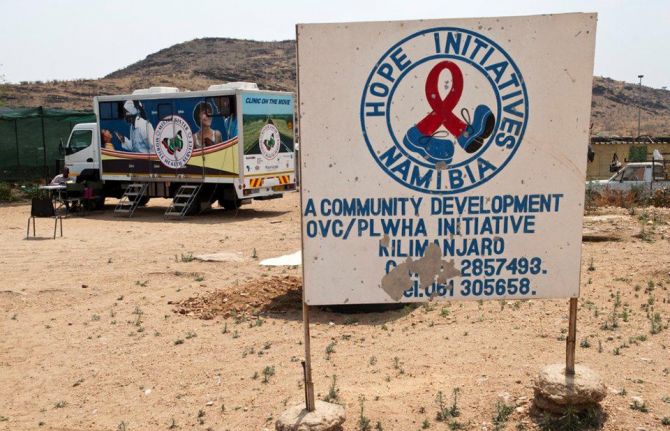
Feature Story
Swaziland launches a new national framework to eliminate new HIV infections among children by 2015
22 March 2013
22 March 2013 22 March 2013
L to R: Dr Simon Zwane, Director of Health Services of Swaziland, Michel Sidibé, UNAIDS Executive Director, Benedict Xaba, Minister of Health Swaziland. Credit: UNAIDS/J.Matas
UNAIDS Executive Director Michel Sidibé joined Swaziland’s Minster of Health, Benedict Xaba to launch a new National Framework to stop new HIV infections among children by 2015 and keep their mothers alive.
Swaziland has dramatically scaled up services to prevent new HIV infections among children in the country reaching more than 90% coverage in 2012.
"The framework will allow us to continue strengthening national programmes to realize our goal of eliminating new HIV infections among children,” said Mr Xaba. “An HIV-free generation is doable in Swaziland,” he added.
The Framework—developed with technical support from UNAIDS, UNICEF, UNFPA and WHO— is divided into four programme areas including HIV prevention, integration of family planning services, improvement of labour and delivery care, and provision of comprehensive antiretroviral treatment.
Health centers providing services to prevent new HIV infections among children expanded from only three in 2003 to more than 150 in 2010. The percentage of pregnant women living with HIV receiving antiretroviral treatment (ART) rose from 57% in 2009 to 86% in 2011, according to government data.
“Our science and political will have reached a point where countries no longer allow children to be born with HIV in Africa,” said UNAIDS Executive Director Michel Sidibé. “With the launch of this new, bold framework, I am confident that Swaziland will reach an AIDS free Generation by 2015.”
The new Swaziland Framework also identifies crucial socio-cultural and economic factors that increase the vulnerability of women to HIV. It proposes scaling-up of various activities, including the increase of male involvement; integration of HIV testing with antenatal care; improving the quality of services provided to HIV positive women and their exposed infants; and social and behaviour change communication to create a supportive community environment.

Launch of the new National Framework to stop new HIV infections among children by 2015 and keep their mothers alive. Ezulwini, Swaziland. 22 March 2013. Credit: UNAIDS/J.Matas
“Today is a day for both celebration and commitment,” said Ambassador Makila James, United States Ambassador to Swaziland. “We should celebrate the effort that went into developing this strategic document, but we must also commit ourselves to fully implementing the critical, life-saving interventions of the framework.”
Despite encouraging progress, 67% of maternal deaths in Swaziland are still attributed to HIV—the leading contributor of maternal and child mortality in the country. The country also has one of the highest levels of HIV among pregnant women.
Swaziland is one of the 22 priority countries highlighted in the Global Plan towards the elimination of new HIV infection among children by 2015 and keeping their mothers alive that was launched in June 2011. The Global Plan calls for urgent strategic and programmatic scale-up to achieve the target of reducing the rate of mother-to-child transmission of HIV to less than 2% by 2015.


